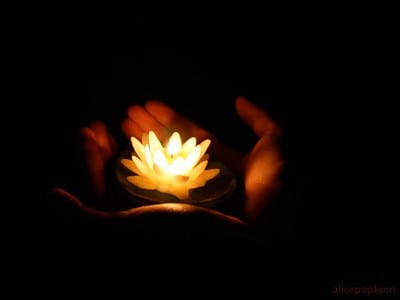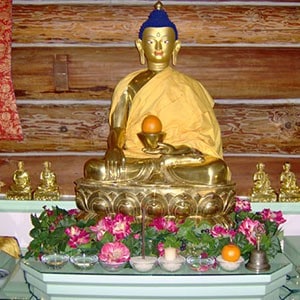Love, compassion, peace
By W. P.

W. P. discusses how love and compassion are the common ground between all religions.
In my short and limited lifetime I have studied many different religions and found a common ground among them. This common ground is the practice of love, compassion, and service.
Love is the most powerful thing on earth. It is capable of relieving suffering, bringing happiness, and creating miracles. In I Corinthians 13:3, Paul wrote: “Even if I bestow all my goods to feed the poor, even if I give my body to be burned, if I have not love, it profits me nothing.” This is one of the most powerful statements I have ever read. To me, it’s saying that you can go through life giving freely, caring for others, and making sacrifices to aid others, but if it’s not done out of love, if you don’t have love in your heart, then you’ve lived your live in vain.
The great Chinese teacher Confucius said, “Human beings regardless of nationality, race or religion—everyone—should be loved equally. We are sheltered by the same sky, and we all live on the same planet earth.” If such insight was promoted through our schools, community organizations, and families then our society wouldn’t have problems with racism, discrimination, and hate crimes. In the Dhammapada the Buddha said, “Hatred never ceases by hatred in this world. By love alone is hatred ceased. This is an ancient law.” Who can argue with such wisdom? Obviously, our elected officials do when they make tougher laws against hate crimes. I guess they plan to scare the hate right out of people, which is often the way of human beings.
Compassion is also very powerful. It allows us to see the world through the eyes of others and gives us understanding into the causes of happiness and suffering. Thich Nhat Hanh, a world renowned Zen Master, wrote in his book Peace Is Every Step of the Way, “The essence of love and compassion is understanding, the ability to recognize the physical, material, and psychological suffering of others, to put ourselves ‘inside the skin’ of the other.” If we gain the ability to see through the eyes of other people, we will see that they are no different from us and that they feel the same need not to suffer and the same desire to be happy.
The people with hate in their hearts, and those who commit destructive crimes don’t do it because they want to be angry and miserable people. They do it out of the delusion that this is the only way they can feel safe and secure. They are trying to protect themselves from the rest of a world that they don’t understand. They want to live a happy and peaceful life too. They just get caught up in their own narrow-minded world and forget about the feelings and sufferings of all the rest of the people in this world. Thubten Chodron, a world-renowned Tibetan Buddhist nun and teacher, gives a very clear explanation of this in her book Taming the Mind:
Sometimes we have a “take-take” mentality. We view everything and everyone in terms of what we can get from them. Neglecting to consider our effects on others, we think only of how others benefit and harm us. This attitude leads us to have problems with others, for no matter what others do or how kind they are, we’re never satisfied. We become grouchy and discontent, making ourselves and those around us miserable.
A way that we can observe this mentality in ourselves is to inquire why we want to have something or why we want to do something. Seeing into our own destructive habits is required before we are ready to fight the hate, anger, and ignorance of this world.
To fight this destructive nature we must use one of the greatest tools, the sharpest sword, and the most pliable remedy: service. It is through our service to others that love and compassion mature in our lives. Through service we overcome the hatred and anger of the world. And most importantly, through our service we gain insight and understanding into the true nature of things.
Service is the focal point of every great religion. For example, in Mark 10: 43-45, Jesus said, “Whoever wants to become great among you must be your servant, and whoever wants to be first among you must be a slave to all. For even the Son of Man did not come to be served, but to serve, and give his life—a ransom for many.” And in Johannesburg when Gandhi was hailed as “King of the Hindus and Muslims,” he replied, “That is not right. I am a servant of the community, not its king. I pray to God to grant me the strength … to lay down my life in the very act of serving.
Our spirituality becomes manifest in our daily lives when we serve others, and it also washes away our worries and fear. Through service we transcend our egotistical self and truly become part of the whole (God, Universe, Buddha Nature, etc.). In the Quran, Imam Ali says, “The most effective thing by means of which you can attain divine blessings is that you should have a kind heart for all human beings.”
We must not discriminate in our service to others, but help equally all those in need, even if they have harmed us in the past. The Golden Rule says, “Do unto others as you would have them do unto you.” It doesn’t say do unto others what others have done to you. Therefore we must teach our children and learn for ourselves to be forgiving, to overlook it when we are harmed or insulted, and not to seek revenge or hold grudges. We must also always remember to be gentle and kind when dealing with others.
There is no difference between people of different faiths, races, or cultures. In the Bhagavad-Gita, the great Indian sage Krishna said: “Perceive that God is within every living being. Mentally bow down to every being and treat all beings equally.” If we see a difference it’s because we are defending our own selfish ego. Until we conquer this illusionary identity of importance we will never find the peace and happiness we long for. But once we have removed this poison from our mind, we will realize that we are part of the whole, and that when we are kind and compassionate to others, we are also being kind and compassionate to ourselves. Here is a story that illustrates this well:
Once upon a time the members of the body were very annoyed with the stomach. They were resentful that they had to procure food and bring it to the stomach while the stomach itself did nothing but devour the fruit of their labor. So they decided they would no longer bring the stomach food. The hands would not lift it to the mouth. The teeth would not chew it. The throat would not swallow it. That would force the stomach to do something. But all they succeeded in doing was making the body weak to the point that they were all threatened with death. In this way, they learned that in helping one another they were really working for their own welfare.
This is our situation: we are all humans, have the same desire to be happy and free of suffering, breathe the same air, and share the same planet. Like the story, we often have to be near death before we realize that the pleasures we gain from material wealth and egotistical delusions are short-lived and only bring us harm in the end. Sometimes we need to be jolted before we realize that a helping hand, a kind word, or even a warm smile brings us ten times the happiness as following our self-centered wishes.
In his Nobel Peace Prize lecture, the Dalai Lama, Tenzin Gyatso wrote:
Because we all share this small planet earth, we have to live in harmony and peace with each other and with nature. This is not just a dream, but a necessity. We are dependent on each other in so many ways that we can no longer live in isolated communities and ignore what is happening outside those communities. We need to help each other when we have difficulties, and we must share the good fortune that we enjoy. I speak to you as another human being, as a simple monk. If you find what I say useful, I hope you will try and practice it.
Whenever we commit a selfish or immoral act, we cannot expect it to bring peace, understanding, and happiness to this world. Instead it adds to the confusion, hate and suffering. Peace is a deliberately achieved state, and it must be constantly maintained. Therefore we must use the words of comfort and forgiveness and acknowledge our appreciation of others. When others are in need, especially those outside our community, we must rush to their aid. We must reach out to them in love, compassion, and understanding. By doing this, we will tear down all religious, racial, and cultural walls and our world will finally live in peace.
Incarcerated people
Many incarcerated people from all over the United States correspond with Venerable Thubten Chodron and monastics from Sravasti Abbey. They offer great insights into how they are applying the Dharma and striving to be of benefit to themselves and others in even the most difficult of situations.


